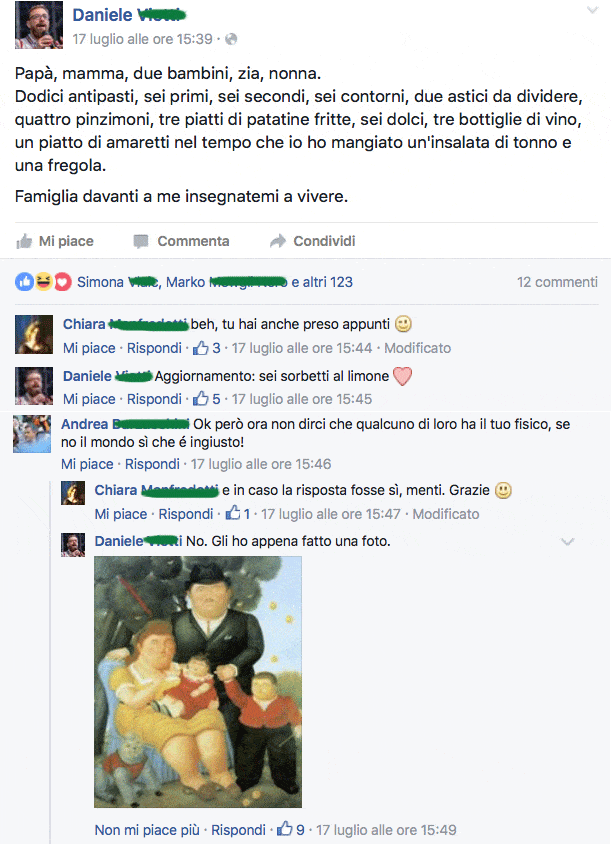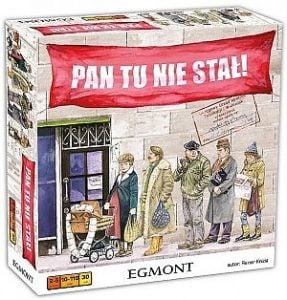Italian Prepositions, Italian Verbs Sapere and Riuscire, and Gargantuan Meals
This week we talk about:
- THE USE OF CERTAIN ITALIAN PREPOSITIONS with special reference to French-speaking students and not.
- THE DIFFERENCE BETWEEN THE ITALIAN VERBS SAPERE and RIUSCIRE.
- THE POLISH GAME “THE QUEUE”, a kind of Monopoli that tells the life in Poland at the time of Communism (thanks Joanna!).
- AN ITALIAN GARGANTUAN MEAL that has in this painting of Botero here below its best representation.
- For those who are interested in political podcast you find them too! Read us for knowing what’s cooking today! 😉
***
Italian Prepositions – Too much “di”
(for French students)
There are many French students at Italian Virtual School. Usually they are good and with different level. Nevertheless they often do the same little mistakes because of a similar structure between Italian and French. Let’s see which it is.
This structure is made by the verb “Essere” (3rd person singular) + the adjective + the infinitive of another verb. In this context the Italian does not use the preposition “di”, the French does. Here some examples:
First: E’ utile leggere (di) il giornale tutti i giorni (Il est utile de lire le journal tous des jours).
Second: E’ importante (di) avere un corpo sano (Il est important d‘avoir un corps sain).
Third: E’ sempre divertente (di) fare la Color Run. (Il est toujours amusant de faire la “Color Run”).
It is really difficult to avoid this mistake. Anyway paying attention to it, you can 😉
***
The Italian prepositions are bizarre sometimes
(for everybody)
The use of prepositions is particular in Italian. In some cases it is better having a practical knowledge of a specific use, than referring to a rule.
One of the most controversial cases is the ambivalence of the prepositions “A” e “IN” to indicate a movement to a place.
For example we say “andare in banca“ but “andare al supermercato“, or “andare a scuola“ but “andare in chiesa“. The use of “A” and “IN” for the singular is often outside any possible rule.
One case by the way seems particularly linear. It is when we go from singular to plural in many of these expressions. Please note the following.
| Sing. A o IN | => | Plur. IN + ARTICOLO |
| A casa | => | |
| A scuola | => | |
| In biblioteca | => | |
| Al bar | => | |
| A supermercato | => | |
| Al cinema | => | |
| A teatro | => | |
| In ufficio | => | Negli uffici |
| In ospedale | => | Negli ospedali |
| In stazione | => | Nelle stazioni |
***
Italian Verbs Sapere and Riuscire
In our previous post we dealt with the clarification of the distinction between two Italian Verbs: SAPERE and CONOSCERE.
We now introduce a further use of SAPERE, that one with the meaning of “being able to do something“. In this case SAPERE requires the infinitive after and indicates the ability of doing a specific action. For example “So suonare la chitarra“, means being able of playing the guitar.
Which is now the difference between the Italian Verbs SAPERE and RIUSCIRE? Like SAPERE, RIUSCIRE requires the infinitive after and indicates a specific ability as well. However between them there is a difference.
In the affirmative sentence RIUSCIRE indicates not only a specific knowledge how about something. I also means the fact that something is particularly difficult for me that make the action.
“So suonare il pianoforte“ is a neutral phrase, “Riesco a suonare il pianoforte“ indicates instead that for me this action is particularly difficult but also that I can do it.
At the same time in the negative form, the verb indicates not only the fact of not having a certain skill (“Non so suonare il pianoforte“). It also recall the fact that I have tried, unsuccessfully, to obtain a certain result (“Ho provato, mi dispiace, ma proprio non riesco“, “I tried, I am sorry, but really I cannot succeed in this situation”).
Here you find a final review about the verb sapere: The Use of The Verb Sapere in Italian. It includes and summarises the most common meanings of Sapere in Italian.
***
An Italian Gargantuan Lunch – The Italian Word “Pantagruelico”
Surfing on Facebook last week , we came across the post you read here below. It tells about a gargantuan lunch taken by a family in an Italian restaurant. Make special attention to what happens when one is asking the author if the diners are similarly slim like him. (The author of the post is quite slim)
***
Italian Podcasts
I recommend these two interesting programs of RADIO 1 to know more about the current events and the international facts:
- RADIO ANCH’IO (from Tuesday to Friday in podcast available in also)
- ZAPPING (from Monday to Friday in podcast available in also)
***
“La Coda”
Finally we indicate an interesting game very similar to Monopoly. It is a Polish game that tells how were the supermarkets (empty and always with long queues) during Communism. Here you find an interesting article about this topic: “Lei ha saltato la fila, signore” (“Sir, You have just cut in the line”).
***
Italian Prepositions, Italian Verbs Sapere and Riuscire, and Gargantuan Meals



You must be logged in to post a comment.